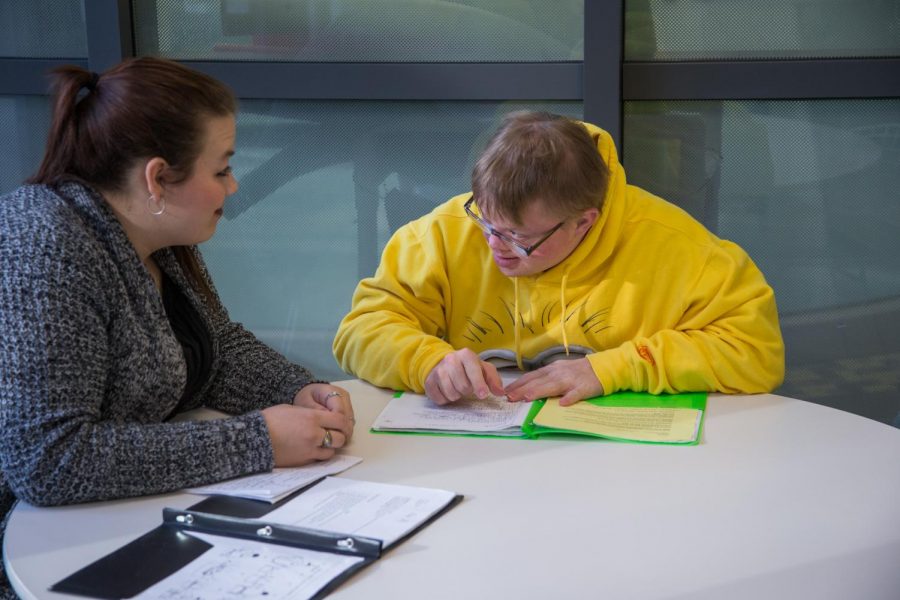NKU’s SHEP program links intellectually disabled students with peer mentors.
“Giving 110 percent:” How the SHEP program transitioned online
Program Director Emily Hellman was curious about how the students in the SHEP program would receive the change to an online semester. Due to campus partially closing, the students have to transition to an online classroom and start Zooming with their professors and peer mentors.
SHEP (Supported Higher Education Program) assists “students with intellectual disabilities” in their college education. Most efforts are largely due to the aid of peer mentors helping them in their social and academic endeavors.
The SHEP organization began making decisions to prepare their students and peer mentors in order to be successful in the online format. One student was primarily using his phone before the transition, so Hellman—with the help of the IT Helpdesk—made sure the student had a laptop to help them prepare.
“To my surprise, I have been pleasantly surprised just how much our parents of the students have been able to continue that connection and engagement,” Hellman said.
According to Hellman, some students miss their friends and the campus experience but they have continued to give “110 percent” into their school work and the program.
Rayce Curry, who is one of the students in the program, just finished his semester in his Acting 101 and modern dance classes.
Curry said his peer mentor has been helpful with his homework, especially in his acting class, as all academic support comes from peer mentors.
“I read my monologue with my peer mentor on Zoom,” Curry said. “She helped me perform it well.”
He said he liked doing his dance final because he “got to show my professor on YouTube my dance moves.”
However, Curry said he missed his friends the most. Every Wednesday, Curry and his peer mentor call Janson Rammage, one of Curry’s friends and another student in the SHEP program, and they hang out for an hour, practicing their dance routines and singing.
Rammage’s mother, Beth Rammage, said those calls were a big highlight of her son’s week because he could just have fun and not have to do schoolwork.
Beth said every weekday since the cancellation of classes, Janson has had a peer mentor call him to help out and go through dance routines with him.
“The instructor is, of course, very much involved in that as well, especially when it comes to any modifications that the students need to be successful in the classroom environment,” Hellman said.
Beth said that it was really difficult for Janson to not be in the dance class because he did not have other students and the instructor to help him. One way the professor helped Janson was in modifying the dance to help him learn better.
The dance professor altered Janson’s final performance to help with his memorization of the dance. For the final, Janson performed it while his mom recorded the performance.
Aside from the academic experience, the SHEP program provides a social experience with internships that allow participating students to get involved. Hellman said many of the students’ internships were canceled because of NKU campus’ partial closure. Some of the internships offered were at the early childhood center, the Campus Recreation Center, Norse Code Radio and Steely Library.
“[Internships] have been suspended for this time period, because a lot of our internships were on site,” Hellman said.
Curry and Janson haven’t been able to physically participate in their internships at Norse Code Radio and the library respectively. However, Janson said he has still been able to be somewhat involved at the library.
Nonetheless, they still miss being on campus. Curry said he misses talking to his friends the most while Janson said he misses the food on campus.
Since transitioning into an online format, Hellman said she noticed how vital communication is for a student to communicate their needs or their experience with their peer mentors or their instructor.
“Just all this different levels of communication that need to be taking place on a daily or weekly basis is really important so that the student is able to be successful and confident in an online format,” Hellman said.
Hellman said the transition to online learning has been smooth, largely due to the efforts of the students, families, peer mentors and instructors.
“I’ve noticed the hard work of our students. I’ve noticed the commitment and the dedication of our peer mentors. Our instructors have been fantastic in making sure that as they adjust their course to an online format that accommodates to diverse learners and students in the SHEP program are able to be included and welcomed and successful, and that’s just huge,” Hellman said.
“It’s a lot of work that’s a lot of time and effort and commitment and I’ve just noticed that across the board so it’s been a really positive experience.”

